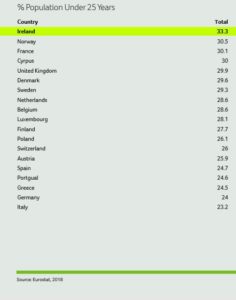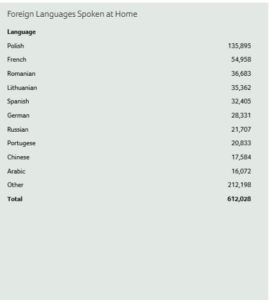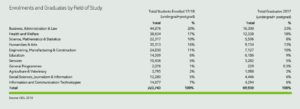Education Level
There are over one million people currently in full-time education in Ireland. These are engaged in three levels of education: primary education (up to 12 years); secondary education (12-18 years); and third-level education (18+ years).
- Ireland has one of the most educated workforces in the world. The share of 30-34 year olds in Ireland with a third level qualification is 53.5%, compared to an EU average of 40%.
- In 2017/2018 over 220,000 students enrolled in third-level courses across Ireland’s universities and colleges.
- Over 30% of students enrolled in Science, Technology, Engineering and Maths (STEM) courses
- Ireland’s young workforce is capable, highly adaptable, educated and committed to achievement.
- Ireland has the youngest population in Europe with one-third of the population under 25 years of age. The population is forecast to increase by almost one million people to 5.75 million by 2040.
- Ireland has one of the most educated workforces in the world. The share of 30-34 year olds in Ireland with a third level qualification is 53.5%, compared to an EU average of 40%.
- Ireland’s education system is amongst the best in the world. It ranks in the top 10 globally for quality of the education system and university education that meets the needs of a competitive economy.
- Ireland is implementing a comprehensive and forward-looking National Skills Strategy and Action Plan for Education, which aims to make the Irish education and training the best in Europe by 2026.
- Springboard+ provides free higher education courses in areas of identified skills needs to unemployed people, those previously self-employed and those turning to work.
- Skillnet Ireland aims to increase participation in enterprise training by companies. It currently supports over 15,000 companies and provides learning experiences to over 50,000 trainees.
- Almost 30% of students enrolled in Science, Technology, Engineering and Maths (STEM) courses.
- 8,357 students were pursuing a Doctorate in 2016/17.
The Government’s Technology Skills Action Plan (2014-2018), aims to maintain Ireland’s position as a global leader for technology talent and skills.
Talent & Education
- There are more than 535,000 non-Irish nationals living in Ireland, with persons born abroad accounting for just over 17% of the country’s population.
- 12 nations – Brazil, France, Germany, India, Italy, Latvia, Lithuania, Poland, Romania, Spain, the UK and the U.S – account for 74% of the non-national population.
- There were 347,233 non-Irish nationals in the labour force when the latest census was conducted in 2016.
- The 2016 Census revealed that over 612,000 residents spoke a language other than English or Irish at home – a 19% increase on 2011.
- Companies operating in Ireland have access to a labour pool of almost 250m people from across the EU.
- For companies who need to recruit talent from outside the EU, IDA Ireland works in close consultation with the relevant Irish authorities on securing employment permits and visas.
- Companies can also avail of a streamlined employment permit applications under the Trusted Partner Initiative.
Ireland is implementing a comprehensive and forward-looking National Skills Strategy and Action Plan for Education, which aims to make the Irish education and training the best in Europe by 2026.
Increasing number of Technology Graduates
The Government’s Technology Skills Action Plan (2014-2018), aims to maintain Ireland’s position as a global leader for technology talent and skills.
This will be achieved through a number of measures one being the issuance of up to 2,000 employment permits per year to experienced technology professionals with skills in high demand. In addition to this through the Tech Life Initiative, the government plan to increase the number of people working in tech in Ireland by 3,000 per year. Log on to www.techlifeireland.com for more information.
Skillnet Ireland
Skillnet Ireland aims to increase participation in enterprise training by companies. It currently supports over 15,000 companies and provides learning experiences to over 50,000 trainees
Find out more at www.skillnetireland.com
Springboard Programme
Springboard+ provides free higher education courses in areas of identified skills needs to unemployed people, those previously self-employed and those turning to work.
For more information see www.springboardcourses.ie
Multilingual Skills
There are more than 535,000 non-Irish nationals living in Ireland, with persons born abroad accounting for just over 17% of the country’s population.
12 nations – Brazil, France, Germany, India, Italy, Latvia, Lithuania, Poland, Romania, Spain, the UK and the U.S – account for 74% of the non-national population.
There were 347,233 non-Irish nationals in the labour force when the latest census was conducted in 2016.
https://www.idaireland.com/invest-in-ireland/education-and-skills
Connected Research
- An exceptional level of collaboration between industry, academia, state agencies and regulatory authorities drives Ireland’s dynamic R&D sector. The Innovation 2020 strategy on R&D, science and technology aims for Ireland to become a Global Innovation Leader.
- Ireland has a strong national research ecosystem with 14 priority areas for Government investment in research clustered across 6 themes.
- Multiple research centres are located throughout Ireland focusing on RDI projects for specific key industry sectors ranging from ICT to Nanotechnology and Marine Science. Examples include INSIGHT, Ireland’s Big Data and Analytics Research Centre and CúRAM, the Centre for Research in Medical Devices.
- The €500m Disruptive Technologies Innovation Fund (DTIF) is seeking applications for funding of over €1m for investment in the research, development and deployment of disruptive technologies and applications. The DTIF aims to support collaboration between enterprises and the public research system.
- Ireland also benefits from access to EU funding under programmes such as Horizon 2020
Ireland’s standing in Global Research Ireland is 11th in global scientific ranking for overall quality of scientific research, an impressive upward trajectory from a position of 48th just 13 years ago. Ireland also ranks highly in specific fields such as:
- 1st for Immunology
- 1st for Animal and Dairy
- 2nd for Nanotechnology
- 2nd for Agricultural Sciences
- 4th for Molecular Biology and Genetics
- 5th for Material Sciences
6th for Basic Medical Research - 6th for Neuroscience and Behaviour
- 7th for Mathematics
- 8th for Chemistry
- 8th for Microbiology
Source: SFI Annual Report 2017; InCites, Clarivate Analytics


